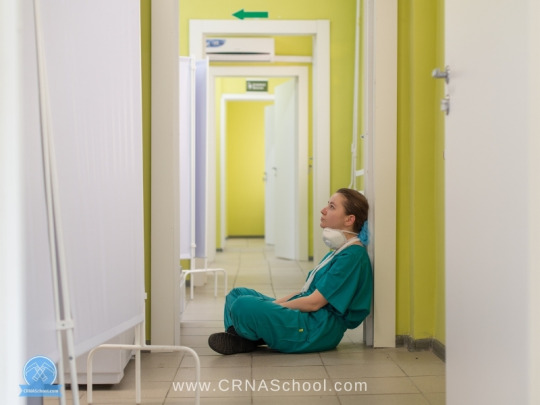Text
How Long Is Certified Registered Nurse Anesthetist Residency?

Undergoing residency is a requirement in nurse anesthesiology schools. It helps prepare the student for the professional life ahead.
Generally, CRNA accredited schools need students to complete a 24-month residency training. This means clocking over 2,000 hours and assisting in more than 600 cases.
Learn more about the nurse anesthetist residency training below.
Why is Residency Included in Nurse Anesthetist Certification Requirements?
Residency is included in Nurse Anesthetist Certification because it is a way to test the skills taught in CRNA accredited schools.
During this time, residents deal with different types of anesthesia and surgical procedures.
While residency is all about refining skills, it also requires good assessment. Critical thinking skills and sound judgment are imperative as well. After all, you will need to manage the client's medical and psychosocial needs.
Do You Get Paid During CRNA Residency?
Unfortunately, nurse anesthetist residents don’t get paid for their service.
Unlike the physician workforce, there are no government funds for advanced nursing training.
Despite this setback, some institutions offer stipends to CRNA residents.

What You Need to Do as a Resident Nurse Anesthetist
Here are the things you have to do as a resident SRNA:
1. Room Set-up
Like any other day at work, preparation is important.
And as a CRNA resident, it all boils down to setting up an ideal operating room. This includes checking the anesthesia machine and drawing up the needed medications.
To avoid forgetting anything, remember the SAMMTIDE mnemonic:
● Suction
● Airway
● Machine
● Monitor
● Tape
● IV Fluid
● Drugs
● Equipment
2. Pre-operative Preparations
Now that the OR is set up, the next step is to assess the patient. It's important to read through the patient's history and medication intake. You also need to note previous reactions, laboratory results, and other pertinent information. Doing so will help you compute allowable blood, among many other things.
In essence, this assessment will help you create a comprehensive anesthesia plan. Additionally, it can prepare you for airway or bleeding problems.
As a resident, you need to refer your plan to the preceptor. This will ensure that all bases are entirely covered.
3. Anesthesia Induction
You need to take the initial vital signs and preoxygenate the patient.
After this, it’s time to induce anesthesia by giving any of the following medications:
● Propofol
● Fentanyl
● Rocuronium
● Lidocaine
Once the drugs kick in, the next step is to intubate the patient to insert an ET tube or laryngeal mask airway. With this, you can hook the patient to the machine and deliver the anesthetic gas.
Once the patient is under anesthesia, the surgeon can start with the procedure.

4. Finishing Up
After the surgery, it's time to turn off the gas and wake the patient up. Once the patient regains consciousness, you can extubate and transfer them to the PACU.
CRNAs are not only involved in the intraoperative process but in post-op care as well. That said, it's vital to watch the patient for a few minutes in the PACU. This will help ensure that the client is stable and comfortable.
Before you go back to the OR, remember to hand off your anesthetic report.
Preparing for Nurse Anesthesia School Clinical Residency
Even if you have excelled in online nurse anesthetist programs, residency is different. You can, however, prepare yourself by following these tips:
Come in prepared.
Read your books, notes, and lectures before going to the OR. Like preparing your machine, your mind should be sharp as well. Who knows? The anesthesiologist or the CRNA may ask you a question (or 12).
Take the initiative.
There will be times when there are not a lot of cases. Instead of doing nothing, observe other providers. Better yet, offer your help - even if it's only pre-op interviews.
Know that not everything will be smooth-sailing.
Your first surgery may be perfect, and your second a disaster. While this may throw your confidence off, it’s a way for you to prove your abilities as a CRNA.
Be open to feedback.
"Taking constructive criticism from others is required to get to the next level." - Wendy Starland
While some may be disheartening, you should use these to improve yourself. Those who offer feedback have been dealing with anesthesia for years. Remember, it’s all part of the learning curve.
Be ready to deal with different personalities.
You will be working with a variety of people: doctors, licensed CRNAs, etc. Some will be helpful, and some will not. In any case, you need to be ready to interact with these personalities.
Be professional.
It’s better to be early than late. It’s essential to make a good impression with the people around you.
Don’t forget to say thank you to everybody who helped you in the OR.
What Happens after CRNA Residency?
After finishing residency and other CRNA school requirements comes graduation.
Once you've earned your degree, you may take the National Certification Examination (NCE).
The NBCRNA oversees this test. It's also the last step you need to take to become a full-fledged CRNA.
The NCE aims to measure the knowledge, abilities, and skills required of a CRNA. You may take it for a maximum of 3 hours.
The exam consists of 70 content outline questions and 30 non-graded pretest questions. The maximum number of questions you can answer is 170.
NCE questions cover the following topics:
● Basic science
● Equipment & instrumentation
● General anesthesia principles
● Anesthesia for special procedures & populations and 30 random, non-graded pretest questions
The above-mentioned questions come in the following formats:
● Multiple correct responses
● Calculations
● Drag and drop
● Hotspot
● Graphics or video

National Certification Requirements for CRNA Professionals
To be eligible to take the NCE, you need to have:
● An unrestricted license as an RN and/or APRN
● Completed an accredited nurse anesthesia educational program within the last 2 years
Remember: it's not enough to have CRNA qualifications and capabilities. You may be ineligible to take the test if you are:
● Diagnosed with any substance use disorder
● Decreed physically or mentally incompetent by a court or regulatory authority
● Documented with allegations of misconduct, malpractice, or unethical conduct
● Subjected to disciplinary action due to cheating or unethical behavior in school
● Convicted or pleaded no contest to a crime
The NBCRNA will provide the notice of eligibility 1 to 5 days after document submission.
Passing the test will make you a certified nurse anesthetist.
Final Words
Nurse anesthetist residency is a long 2-year path, but it's worth it. It leads to your certification, after all.
While it is very challenging, it is an irreplaceable learning experience. What you learn from here will prove vital in your practice as a future CRNA.
References:
https://www.nursing.upenn.edu/nurse-anesthesia/
https://www.aana.com/membership/become-a-crna/minimum-education-and-experience-requirements
https://www.nbcrna.com/docs/default-source/publications-documentation/handbooks/nce_hb(1).pdf
0 notes
Text
Do Nurse Anesthetists Have High Employment Rates?

The pandemic has created a high demand for a lot of medical jobs. If you’re on the path to becoming a nurse anesthetist, you may have wondered, do nurse anesthetists have high employment rates?
Employment rates for CRNAs are higher than ever and are projected to increase in the years to come. Nurse anesthetist jobs are expected to increase rapidly at the rate of 26% through 2028, far exceeding the average rate for other industries and professions.
The continuing coronavirus pandemic, an aging population, and a need to substitute a huge proportion of retiring health professionals and those who move to other career paths are all anticipated to give nurse anesthetists high employment rates.
Certified Registered Nurse Anesthetist (or CRNA) job vacancies are expected to increase by 17%, with the majority of opportunities in rural communities, inner cities, and other underserved areas. In the next ten years, approximately 3,200 nurse anesthetist jobs will become accessible.

Is Nurse Anesthetist in High Demand?
Nurse anesthetist jobs are expected to increase rapidly at the rate of 26% through 2028, far exceeding the average rate for other industries and professions. Certified Registered Nurse Anesthetist (or CRNA) job vacancies are expected to increase by 17%, with the majority of opportunities in rural communities, inner cities, and other underserved areas. In the next ten years, approximately 3,200 nurse anesthetist jobs will become accessible.
The continuing coronavirus pandemic, an aging population, and a need to substitute a huge proportion of retiring health professionals and those who move to other career paths are all anticipated to give nurse anesthetists high employment rates.
What Are Nurse Anesthetists and What Do They Do?
Registered nurses who specialize in anesthesiology and have at least a year of critical care knowledge and a master's degree, which normally takes two years to complete, are known as Nurse Anesthetists.
Certified Registered Nurse Anesthetists (CRNAs) are expert clinical nurses who securely administer over 40 million anesthetics in the United States each year for clinical, postnatal, and damage care. From surgical intervention to discomfort moderation practices, they prescribe every type of anesthetic, work in every type of practice setting, as well as provide treatment for every sort of medical activity or procedure.
Nurse anesthetists work with doctors, orthopedic surgeons, orthodontists, orthopedists, and other competent medical professionals to administer anesthetics to patients. They are provided a significant level of autonomy and positive regard as advanced practice registered nurses.
Nurse anesthetists can implement particular or regional anesthesia using a variety of intravenous drugs and inhaled gases, allowing doctors to accomplish procedures with next to no pain to the patient. From the chloroform used by the first nurse anesthetists during the Civil War, modern anesthesia has made great strides.

A nurse anesthetist is responsible for a patient's anesthesia needs before, during, and after surgery or childbirth by:
Conducting a physical examination
Taking part in preoperative education
Being ready for anesthetic administration
Using anesthesia to hold the patient pain-free.
Intraoperative anesthesia maintenance
Supervising anesthesia recovery
Observing the patient's rehabilitation from the emergency room to the patient care unit
How to Become a Nurse Anesthetist
A standard route to becoming a CRNA includes earning a four-year BSN, becoming certified and serving as a registered nurse for one to three years, and eventually enrolling in a two-year MSN program in nurse anesthesia. Other choices involve receiving an associate degree in nursing, gaining licensure and practicing as an RN, and enrolling in an RN-to-MSN program; or undertaking a BSN-to-DNP bridge program.
Depending on the degree sought, the period it takes to become a certified CRNA varies. CRNAs must complete comprehensive studies, including at least 2,000 hours of clinical practice.
CRNAs must be registered nurses (RNs) or advanced practice registered nurses (APRNs) with national qualifications in nurse anesthesia from the NBCRNA. The National Certification Exam (NCE) and the Self-Evaluation Examination are needed for certification (SEE).

1. Obtain a Bachelor of Science in Nursing degree
Earning a Bachelor of Science in Nursing (BSN) degree is the first phase. A bachelor's degree in nursing requires an average of four years to complete.
2. Obtain your certification as a licensed nurse
The next move after obtaining a BSN is to secure a registered nurse (RN) certificate. To sit for the RN test, you must first hold a bachelor's degree in nursing.
3. Work as a Nurse in Acute Care
After that, you'll want to obtain experience in an intensive care environment before applying to a CRNA program. Most CRNA programs enable you to get more than a year of training, but each program has its own set of criteria on what constitutes acute treatment.
Serving in a coronary treatment facility, an emergency department, or an intensive care unit is what most CRNA programs describe as acute care. Since CRNA programs vary, before taking a job in an acute care environment, you can review the criteria of your chosen CRNA schools.
4. Finish CRNA School
It's time to apply to CRNA schools after you've completed all of the above requirements . A nurse anesthetist program will take two to three years to complete, depending on the school.
CRNA schools instruct their pupils both in the classroom and in clinical environments. You must then complete the National Qualification Test after completing your CRNA program.
What Are The Top Paying Industries for Nurse Anesthetists?
Hospitals, which include NPs, nurse midwives, and CRNAs, are the highest-paying profession for APRNs, according to the US Bureau of Labor Statistics (BLS), with a total annual wage of $122,420.
Outpatient medical facilities (median average wage of $118,530), doctors' offices ($113,190), other clinical professionals' offices ($112,590), and educational services ($108,790) are other high-paying environments. CRNAs make more money than most APRNs, with an annual income of about $175,000 for nurse anesthetists.
What States Pay the Most for Nurse Anesthetists?
Wyoming has the largest CRNA wages, with workers receiving a mean annual salary of $243,310, according to the BLS, led by Montana ($239,380), Oregon ($234,750), Wisconsin ($233,600), and California ($227,290).
According to the BLS, Texas employs 4,300 CRNAs, followed by North Carolina with 3,190, Tennessee with 2,680, Ohio with 2,450, and Michigan with 2,330. Michigan tops the ranking in terms of nurse anesthetist pay, with a mean annual wage of $194,640, led by North Carolina ($189,060), Ohio ($184,380), Texas ($167,020), and Tennessee ($157,070).
The Bottom Line
Nurse anesthetists operate in many environments, including conventional hospital surgery suites and obstetrical delivery rooms, critical access clinics, ambulatory surgical centers, orthodontists' clinics, podiatrists' office spaces, ophthalmologists' clinics, plastic surgeons' clinics, and pain relief specialists' departments, as well as federal, Veterans Services, and healthcare system health treatment facilities. They have a lot of responsibilities and are well paid for them. There is a constant increase in the demand for nurse anesthetists in both rural and urban healthcare setups. As a result, the job opportunities for nurse anesthetists are increasing every year and are predicted to increase even more in near future.
References
Journal of Professional Nursing, Volume 16, Issue 1, January–February 2000, Pages 47-56, Ph.D., RN, CRNA, FAANWynne R.Waugaman(Associate Professor of Nursing and Assistant Chair of Academic Affairs).
https://doi.org/10.1016/S8755-7223(00)80011-3
Does the Employment of Physician Assistants and Nurse Practitioners Increase Liability?
Roderick S. Hooker, Ph.D., PA; Jeffrey G. Nicholson, Ph.D., PA; Tuan Le, M.D., DrPH
Journal of Medical Regulation (2009) 95 (2): 6–16.
https://doi.org/10.30770/2572-1852-95.2.6
Role Transition After Clinical Nurse Specialist Education, Ares, Terri L. Ph.D., RN, CNS-BC, Clinical Nurse Specialist: March/April 2018 - Volume 32 - Issue 2 - p 71-80 DOI:10.1097/NUR.0000000000000357
The Certified Registered Nurse Anesthetist: Occupational Responsibilities, Perceived Stressors, Coping Strategies, and Work Relationships, Perry, Tristan Roberts.
http://hdl.handle.net/10919/29740
4 notes
·
View notes
Text
What Experience Do I Need to Become a CRNA?

The minimum experience you need to become a CRNA is at least one year of experience in a clinical setting. The nursing career is one of the most rewarding careers available. As a nurse, you can help make a difference in many lives. Are you considering a nursing career or advancing your nursing career? Read on.
What is a CRNA?
A CRNA is a registered nurse who administers anesthetics to patients, provides post-surgical care, and monitors their vital signs. CRNAs work in emergency rooms, clinics, outpatient settings, and intensive care units of hospitals.
As a CRNA, you’ll need these skills:
Interpersonal communication
Teamwork
Verbal and written communication
Emotional intelligence
Stamina
Organization
Time management
What does a CRNA do?
A CRNA provides critical care through the safe delivery of anesthetics to patients in need of pain management. CRNAs oversee the anesthesia process, monitor vital signs throughout the surgical procedure, and provide specialized care after a surgical procedure. A CRNAs’ daily routine also involves:
Requesting diagnostic studies
Educating patients about side effects and risks
Creating anesthetic plans
Examining patient’s medical history.
Administrative duties like managing finances and training staff.
What are the Steps to Become a CRNA
Earning a CRNA involves several years of schooling. Here are the steps to become a CRNA:
1. Get a Bachelor of Science in Nursing
Completing a BSN program is the first step to obtaining a CRNA license. The BSN program is an undergraduate program that can be as long as four years. However, the length can vary depending on the number of college credits you have.
The accelerated BSN program is designed for bachelor’s degree holders in unrelated fields. With the accelerated BSN program, you can earn your BSN within 11 months. Maintaining an average grade point of 3.0 is important, especially if you want to later earn a master’s degree.

2. Obtain State Licensure as an RN
Following your BSN’s completion, you’ll need to get a license that allows you to practice. To obtain an RN license, you’ll need to pass the National Council Licensure Examination for Registered Nurses.
The License requirement is different for each state. Therefore, you’ll need to carry out extensive research if you want to move to a different state later on.
3. Gain Experience
Before applying for a nurse anesthesia program, it’s important to work in a clinical setting for at least a year. Gaining experience is more than a requirement. Experience in a cardiac care unit, emergency room, or intensive care unit will strengthen your portfolio.
Earning a Critical Care Registered Nurse Certification can help you get accepted into the CRNA program. Some programs will require you to complete hours of work in critical care situations before you can earn the certification.

4. Earn your Master’s or Doctorate in Nursing
Nurse anesthetists need to get a master’s or doctorate because they are advanced practice registered nurses (APRNs). It takes two years to complete a master’s degree, while a doctorate can take between four and six years.
With a master’s degree, you can enter the workforce sooner than you would if you were working on a Ph.D. . However, the Ph.D. will increase your chances of achieving a higher position. Here are some of the requirements you’ll need, irrespective of the program you choose:
College transcripts
BSN degree
Minimum of two years working experience as an RN
Proof of a valid RN license
3.0 GPA in college
Specialized certifications
Experience shadowing a CRNA anesthesiologist
Background check
Goal statement or personal essay
One year of experience working in the intensive care unit.
One of the most important things to do is to research the requirements of your school of choice. You must ensure that the school is accredited.
5. Become a CRNA
The final step after completing the program to be a CRNA is to obtain a license. To do this, you’ll need to take a final test. The National Certification Examination lasts up to three hours, and it is the final test before becoming a CRNA. You’ll be eligible for employment only after you have passed the test.

6. Maintain your Status
Take all the steps to maintain all the CRNA credentials you’ve earned. Your license expires every two years, and you’ll need to recertify it to maintain your employment. The recertification process involves a combination of practice hours, education hours, and examinations. CRNAs will need to recertify their CRNA certification and their state-level APRN.
Is a CRNA Degree Right for Me?
The CRNA program won’t be a great choice for you if you like an easy and predictable job. The CRNA course is demanding and rigorous. Once you’ve become a CRNA, you’ll find yourself in cases that require critical thinking.
As a CRNA, you’ll need a high level of preparedness and responsibility. The job can be exciting, and it’s filled with many interesting moments. A CRNA role will be right for you if you are looking for a highly-respected and highly-compensated job.
Frequently Asked Questions
There are so many questions surrounding the CRNA career because of the nature of the professional education and employment involved.
Here are some frequently asked questions:
How long is a CRNA education program? The CRNA program takes up to 36 months to complete. It includes clinical and classroom experience work. The curriculum includes physiology, chemistry, pharmacology, physics, pathophysiology, anatomy, and biochemistry.
Where do CRNAs work? Most CRNAs work in medical settings like ambulatory surgery centers, traditional hospitals, pain clinics, and doctor’s offices. Some work in the private sector, while others in the public sector. You’ll find many CRNAs working as independent contractors for hospitals and physicians.
How does a nurse become a CRNA? As a nurse with a BSN and an RN license, you can apply for the CRNA program. Once you graduate, you’ll need to pass the National Certification Examination to become a CRNA.
youtube
In case you cannot view this video here, please click the link below to view What Experience Do I Need to Become a CRNA? on my YouTube channel: https://www.youtube.com/watch?v=nX2ygn1FlZY
0 notes
Text
How Does A Registered Nurse Become A CRNA?

Licensed Nurses with a CRNA degree provide anesthesia in conjunction with physicians, dentists, podiatrists, physician anesthesiologists, and additional healthcare experts, according to the American Association of Nurse Anesthetists, and provide the bulk of anesthesia services in rural America.
A registered nurse must meet important criteria in order to become a CRNA, pursuing specializations, enrolling in an approved nurse anesthesia program, achieving qualifications, and obtaining licenses.
Consider becoming a Certified Registered Nurse Anesthetist (CRNA) if you are a registered nurse who is self-sufficient, devoted to delivering high-quality patient care, and active in progressing in your profession. You’ll also be making substantially more money. Plus, you’ll have plenty of job opportunities in a burgeoning profession. From 2018 to 2028, the Bureau of Labor Statistics expects a 17 percent rise in work openings and demand for CRNAs.
Below, we’ll look at the steps a registered nurse must take to become a CRNA.
Is a CRNA a nurse?
An advanced practicing registered nurse (APRN) who is licensed and qualified to provide anesthesia for surgery, labor, and childbirth, emergency treatment, or pain relief is classified as a nurse anesthetist.
The CRNA degree offers the expertise and training required to prescribe and prescribe anesthesia to patients, as well as observe and advise physicians of their patients' conditions when they are under anesthesia. Pre- and post-anesthesia treatment and reports are given by degrees.
Some people are surprised to hear that nurses and anesthesiologists deliver anesthesia care in the same way: they provide the same treatment with the same operations in the same styles of hospitals. The anesthesiologists work with the CRNAs to provide the best quality treatment for the patients.
According to the American Association of Nurse Anesthetists (AANA), nurse anesthetists have the bulk of hands-on anesthesia emergency treatment in the United States.
Certified Registered Nurse Anesthetists (CRNAs) originated during the Civil War, when nurses on the front lines began prescribing chloroform to injured soldiers. Today, CRNAS deliver anesthesia in almost all rural American hospitals, and are the exclusive anesthesia services for men and women working in the United States Armed Forces (USAF) .
You'll find a lively, in-demand job as a CRNA, but you'll require advanced preparation and outstanding education to smooth the path to the top of the nursing profession.

What Are the Requirements for a CRNA Degree?
Though each CRNA curriculum has its own set of standards, the chief requirements are usually the same for all schools.
A bachelor's or master's degree in nursing or a related field is needed.
A valid certificate as a Registered Nurse or Advanced Practice Nurse with no restrictions.
One year of full-time service as an RN in a critical care environment is expected.
A master's degree in nurse anesthesia from an approved program is needed.
Most CRNA programs last two to four years. The curriculum typically provides both theoretical classroom instruction and practical clinical hours, where students learn to anesthesia care to patients in a variety of settings.
How can I become a CRNA fast?
1. Look for specializations while working as an RN in a critical care environment
If an RN has the necessary number of clinical practice hours, they may obtain a critical-care registered nurse (CCRN) credential when employed as an RN. A CCRN is a specialist credential for nurses who give primary treatment to extremely sick adult patients in every environment.
One year of full-time experience, or its part-time equivalent, as a certified nurse in a critical care environment is expected, according to the American Association of Nurse Anesthetists.

2. Be accepted into an approved nurse anesthesia program
Applicants must be admitted into an approved graduate nurse anesthesia program before they can become a licensed CRNA. Students can select from 121 separate approved nurse anesthesia programs and almost 1,800 active clinical centers across the USA.
Course standards differ by college or institution, although most require a candidate to have a current RN license, a bachelor's degree in nursing, and a minimum GPA. A master's degree in nursing may be needed for certain programs.
RNs joining nurse anesthesia programs usually have, on average, a total of 2.9 years of training (AANA, 2019).
3. Get your degree of doctor of nursing practice in anesthesia(DNAP)
Some nurse anesthesia programs offer a master's degree that prepares graduates to sit for the CRNA qualification test. This is a crucial step, since by 2025, you'll need a doctorate in nurse anesthesia to work as a CRNA. Until 2022, a few programs will already deliver a master's degree that fits the qualification requirements.
Although CRNAs with a master's degree will be grandfathered in, many degree-seekers are already opting for doctoral programs, which will provide them with the most specialized skills and experience in the profession and enable them to explore further job choices with higher pay.
Anesthesia pharmacology, obstetric anesthesia, anesthesia pathophysiology, anesthesia pathology, and geriatric anesthesia are among the subjects discussed in greater detail in DNAP programs.

4. Acquire the Nurse Anesthetist Certification and Recertification from the national board of certification (NBCRNA)
After completing their degree from an approved program, professionals must complete the national qualification test and gain certification from the National Board of Certification and Recertification for Nurse Anesthetists. Professionals must pass the exam by answering between 100 and 170 questions on detailed topics.
5. Acquire nurse practitioner state licensing
Professionals who wish to work as nurse anesthetist in specialized practice nursing must obtain state-specific licensing. The licensing standards differ from state to state.
6. Look for employment
Verified nurse anesthetists usually find work as entry-level anesthetists after graduating from an approved program and passing the specialty qualification test. Professionals can apply for jobs in specific fields as they gain more career experience.
The Bottom Line
A licensed registered nurse anesthetist (CRNA) is responsible for efficiently prescribing anesthesia before emergency operations, then delivering vital treatment at some of the most crucial moments of their patients' lives.
Whatever stage of your undergraduate or professional life you are in, there is a clear direction to pursue that will lead to a fulfilling future as a nurse anesthetist. If you haven't already done so, get a CCNE-accredited bachelor's degree in nursing from a respectable nursing school.
If you're interested in studying more, make sure your next move is a smart investment in your nursing career.
References
Military Medicine, Volume 171, Issue 8, August 2006, Pages 762–769, Constance L. Jenkins, NC USA, Aaron R. Elliott, NC USA, Janet R. Harris, NC USA https://doi.org/10.7205/MILMED.171.8.762
AANA Journal. Aug2017, Vol. 85 Issue 4, p261-269. 9p. Boyd, Donald
The Certified Registered Nurse Anesthetist: Occupational Responsibilities, Perceived Stressors, Coping Strategies, and Work Relationships. Perry, Tristan Roberts http://hdl.handle.net/10919/29740
Nurse Anesthesia, A Past, Present, and Future Perspective. VOLUME 47, ISSUE 2, P215-223, JUNE 01, 2012, Wanda O. Wilson, CRNA, Ph.D., MSN
youtube
In case you cannot view this video here, please click the link below to view How Does a Registered Nurse Become a CRNA? on my YouTube channel: https://www.youtube.com/watch?v=-MFrgaTuz3Q
1 note
·
View note
Text
How To Increase Nurse Anesthetist Career Advancement

If you’re a nurse or nursing student who is trying to decide which career path to take, you have many options. Sometimes it can be hard to decide which way to go. One option to consider is becoming a CRNA, or certified registered nurse anesthetist.
A CRNA is a great choice to make. A CRNA is an advanced practice nurse who specializes in anesthesia. They administer anesthesia to patients having surgery, and are vital to surgical teams.
If you want to become a nurse anesthetist, there are many things that you'll need to know. What exactly are their responsibilities? What are the benefits of becoming a CRNA? This post is here to answer those questions.
What Does a CRNA Do?
A nurse anesthetist is responsible for a patient from the pre-op area all the way through the recovery room. A CRNA, though, has many specialist tasks which only they can perform. Essentially, they give anesthesia and monitor patients through its duration of action. The CRNA is there to make sure the patient goes under safely and comes out fine.
The CRNA is in charge of anesthesia on their own. In some workplaces, he or she may be part of a team with an anesthesiologist.
Here are some of a CRNA’s responsibilities:
The nurse anesthetist assesses the patient’s physical state before the surgery. He or she will make sure that the patient’s condition is safe for anesthesia.
A CRNA will talk with the patient before the surgery. This is to ensure that the patient understands the process and what will happen. It also helps to reassure patients and take care of any fears they may have. CRNAs will also discuss the recovery process in detail.
After the CRNA has informed the patient of the process, he or she can then obtain consent. Consent is the official means of getting permission to allow the team to go ahead with the procedure.
The nurse anesthetist is also qualified to prepare anesthetic solutions. He or she will make sure that the dosage of the anesthetic is precise for the specific patient. Anesthetics can cause serious side effects if administered incorrectly. This is why CRNAs have to earn the qualifications to enable them to handle such substances.
The CRNA also administers the anesthetic drugs in the precise amount required.
Once the patient is under, the CRNA's job is to maintain that state. The effects of anesthesia should not wear off until the procedure is over.
The nurse anesthetist also ensures the patient remains stable through the surgery. He or she will remain with them and monitor vital signs.
After the surgery is complete, the nurse anesthetist comes in again. He or she must ensure that the patient comes out of anesthesia. The nurse anesthetist will also monitor the patient’s post-op recovery before transfer.
What Are the Benefits of Choosing a Nurse Anesthetist Career?
There are many advantages to becoming a CRNA. They include the following:
The pay is excellent. Nurse anesthetists are the highest-paid nurse specialization. Naturally, this attracts many to the field. However, even for those who have a genuine desire to become a CRNA, the pay is a very good incentive.
Many people accord them much respect. Being a CRNA comes with a lot of respect from healthcare workers. They are an important part of medical teams and this is often recognized. The time and dedication it takes to become a CRNA is also something many people recognize. This explains their frequent involvement in many administrative processes. The judgment of a CRNA is held in high esteem!
The freedom to make clinical decisions. In the medical field, many people wish to make their own decisions. After years of working, it may sometimes be monotonous acting on other people’s decisions. A nurse anesthetist gets the independence to make decisions on their own. They can make plans and choices that ensure the patient remains in the best of health. This autonomy is a major advantage to many people.
How to Advance Towards a Nurse Anesthetist Career
Before you make that decision to work towards being a CRNA, see if you can shadow a nurse anesthetist on the job. This will give you the best exposure to a CRNA’s daily work life. It will help you see all the benefits firsthand, and will increase your interest!
If you have already been able to shadow, you’ll know if becoming a CRNA is something you have an interest in or not. If it is, then great! It is important to know that it takes a lot of steps to finally get to the last stage, which is CRNA. If you have the dedication, you can do it!
Here is a brief overview of the steps you need to take to become a nurse anesthetist!
If you are a student, or about to enter nursing school, your degree is the first step. You will need a Bachelor of Science in Nursing degree. With this, you can proceed to the next step.
You must become a registered nurse. But as a new graduate, you will need to pass the NCLEX-RN exam. After this, you can apply for an RN license.
You will have to gain at least a year of critical care experience. Different programs have different requirements. Some may need more than that, but a year is the official minimum.
Now, you will need a Doctor of Nursing Practice degree in Nurse Anesthesia. It was previously a Master’s Degree of Science in Nurse Anesthesia. However, the requirements will change by 2025. If you are yet to start a program, it is best to go for a DNP. It takes only a year longer in most cases.
Now comes the final step. You will have to pass the National Certification Exam. The National Board of Certification & Recertification for Nurse Anesthetists organizes it. That’s a mouthful! Once you have passed this exam, you can finally get the CRNA credential.
This is a summary of the steps you will need to take. Some of these steps will have more complexity to them, but this is the basic state of things.
There are many rewards to being a CRNA. As an RN or a student, you should consider whether this is the right step for you.
It is important to keep in mind that becoming a CRNA takes a lot of dedication. It’s going to take time, but in the end, it is worth it.
0 notes
Text
Is It Possible To Become A CRNA Online?

Certified Registered Nurse Anesthetists are advanced practice nurses (APNs) that specialize in anesthesia. With almost any skill learned online these days, you might be wondering: can you become a nurse anesthesiologist online?
Yes, it’s definitely possible to become a CRNA online. Aspiring nurse anesthetists can take advantage of online programs to obtain their degrees. Online programs are available from undergraduate programs all the way up to recertification. Online programs for CRNA usually work well to build a student-faculty relationship unaffected by distance learning.
A CRNA possesses a great deal of independence and knowledge that they acquire with proper training and licenses. One mistake could be fatal to the patient.
They understand the correct administration of drugs, and support surgeons, anesthesiologists, and patients in all types of surgeries and healthcare settings.
Certified registered nurse anesthetists play an essential role in the healthcare system. They fulfill their job requirements like any other medically-trained anesthesiologist. They are a subset of advanced practice nursing, but they follow a faster pathway to joining the labor force.
Nurse Anesthetist Certification Requirements
CRNA requirements involve obtaining a BSN and completing health assessment courses, physiology, pharmacology, anatomy, and health assessment.
After earning your bachelor’s degree, you can receive your R.N. license and gain a minimum of one year of working experience as an R.N. in a critical care setting.
The next step is enrolling in an accredited nurse anesthesia program and graduating with a master’s degree. When you complete your education requirements, you must pass the National Certification Examination through the National Board of Certification and Recertification for Nurse Anesthetists.
Requirements for Nurse Anesthesia Educational Programs
Although degree programs differ from the others, there are minimum education requirements for CRNA you need to meet. The Council on Accreditation of Nurse Anesthesia Educational Programs enforces these requirements to gain and reserve accreditation.
They include:
Active R.N. license
Minimum of one year of experience as an R.N. in a serious care setting
Minimum 3.0-grade point average
Requirement courses
BSN degree
Official transcripts indicating academic success in Bachelors-level degree programs
Minimum GRE score of 300 or more
Personal letters of recommendation
As a graduate of the CRNA program, you must pass the National Board of Certification and Recertification for Nurse Anesthetists’ credentialing exam.
You must continuously recertify on an 8-year cycle administered using a two-year check-in program to ensure that CRNAs uphold their licensure.

List of Accredited Programs for CRNA
How Many Years to Become a Nurse Anesthetist
In addition to the years of education requirements, a minimum of one year of critical care clinical experience working as an R.N. is required before a person qualifies for entrance into a CRNA school program. In total, it takes about seven to eight years of education to become a CRNA.
CRNA Accredited Schools
Several schools are designed to prepare you to become a certified CRNA include:
University of Iowa
Drexel University
University of Minnesota-Twin Cities
Columbia University, NY
Duke University
University of Pennsylvania
Wayne State University
University of Cincinnati-Main Campus
University of Southern California
University of Pittsburgh-Pittsburgh Campus
Case Western Reserve University
Emory University
University at Buffalo
Rutgers University-New Brunswick
University of Kansas
University of Connecticut
Barry University
Loma Linda University
Oakland University
University of Alabama
University of Detroit
Online Nurse Anesthetist Programs
Online programs for CRNA prepare you to practice in all settings; however, you might concentrate on a particular department. According to the AANA, CRNA students can usually specialize in one of the following areas:
Neurosurgery
Pediatrics
Cardiovascular
Plastic
Obstetrics
Dental

Experience Needed for CRNA
Which ICU Experience Is Best for CRNA?
As a CRNA, you must comprehensively understand how to use various technologies and tools to quickly and efficiently do your job. The most essential tools are the ones specifically related to anesthesia. These include, but are not limited to:
Anesthesia inhalers
Gas anesthesia apparatus
Electronic stethoscopes
IV infusion pumps
Airway kits
Cardiac monitoring units
Endotracheal or tracheostomy sets
Epidural anesthesia equipment
As a competent CRNA, you should be skilled with numerous software applications designed for the job. Programs like eClinicalWorks software, ELemis Anesthesia Manager, Skyscape AnesthesiaDrugs, and several others that focus on anesthesia medications, dosages, and usages.

CRNA Qualifications and Capabilities
The job of a CRNA goes beyond simply injecting medications. They offer anesthesia to patients undergoing diagnostic, surgical, therapeutic, and obstetrical medical procedures. They offer nerve blocks, spinal blocks, and other kinds of pain relief before, during, and after the process.
They take a detailed approach to patient care, view records about the patients’ health, talk to the patient before the procedure and answer any questions; they monitor the patient throughout the procedure and make adjustments to ensure a smooth, seamless experience.
Certification Requirements for CRNA
COA accredited nurse anesthesia educational programs require a bachelor’s degree, a registered nursing (R.N.) license, and a minimum of one year of experience as a nurse in an acute care setting, according to the American Association of Nurse Anesthetists (AANA)’s CRNA Fact Sheet. Upon completing the program, aspiring CRNAs must pass the national certifying exam to practice as nurse anesthetists.
CRNA is an advanced major practice for nurses. And even though the main requirements of becoming a certified registered nurse anesthetist vary from state to state, you must graduate from a nurse educational program accredited by the COA and pass the certification examination administered by the National Board of Certification and Recertification for Nurse Anesthetists (NBCRNA)
Accredited Nurse Anesthesia Educational Program
Accreditation of programs of nurse anesthesia at the masters, post-masters, or doctoral degree level in the United States is recognized by the Council of Higher Education Accreditation (CHEA) and the U.S. Department of Education (USDE)
Programs Required to Become CRNA
GPA of 3.0 or higher
Life support certifications (BLS, ACLS, PALS)
Combined minimum GRE of 300 or better.
Clinical Requirement for CRNA
To become a CRNA, you must have completed more than 2,000 clinical hours and administered more than 600 clinical cases before graduation.
CRNAs can practice in all 50 states but must complete necessary training before graduation.
According to the COA Standards for Accreditation, you must meet specific training criteria, including at least one year of critical care nursing experience and a passing score on the National Certification Exam (NCE).
0 notes
Text
How Many Hours A Week Does A CRNA Work?

Certified Registered Nurse Anesthetists (CRNAs) administer anesthetics to make treatment and surgeries safer. These professionals also help to ensure patient security and comfort. Anesthesia helps medical procedures. This is because it puts patients in a restful state and ensures that they feel no pain. It also puts the patient in a stationary position so that they don’t move during the operation.
Anesthesia treatment involves an education session between the patient and the nurse anesthetist. The nurse enlightens the patient on the anesthesia’s possible side effects. They also provide answers to questions the patient may ask.
CRNAs work in different communities, and they come from all walks of life. CRNAs are the sole providers in about 100% of all rural hospitals. This is from the American Association of Nurse Anesthetists (AANA) reports.

What Does a CRNA Do Every Day?
Nurse anesthetists check patients undergoing medical procedures such as surgery. A typical day involves the following:
Managing patients’ airways
Preparing and administering drugs before and after anesthesia
Observing patients’ reactions to drugs.
Administering epidurals in maternity wards
Performing pre-anesthesia screenings to determine a patient's risk.
CRNAs also perform the following:
Pre-op and post-op rounds
Respond to codes
Place central lines
Place and manage labor epidurals.
Ventilatory management
Consults for pain management.
CRNAs also inspect patients’ medical records to better understand how they may react to anesthesia treatment. The medical procedure will be more difficult if the patient does not respond well to the anesthesia.
Nurse anesthetists also help check:
Vital signs and the patient’s blood pressure
Heart rate, body movement, and body temperature.
All this is to ensure that the patient will react well to the treatment.

What’s A CRNAs’ Schedule Like?
Surgeons are often choked up with demanding schedules. Their duties range from pre-determined schedules to responding to emergencies. CRNAs tend to have busier schedules because they need to be present for most surgeries. Their schedules are often busier than that of surgeons. CRNAs are even busier when they work at hospitals with obstetrics.
CRNAs hours depend on different factors. Things like how often they work, where they work, and if the hospital is short staffed will affect a CRNA’s hours. Operation hours of the facility, patient load, and if a nurse calls out sick can also increase a CRNA’s hours on short notice.
A nurse anesthetist can work for health clinics and private practices. They can also work in doctor’s offices. These work settings usually have firm “official hours”. Thus, the nurses only work during those official hours, with usually no overtime. The official hours might be from 8 am to 5 pm on weekdays, equal to 40 to 50 hours a week.
It is different for nurse anesthetists that work in hospitals. Their work hours are different when compared to those that work in private practices. Nurse anesthetists in hospitals work shifts between 8 to 24 hours. It depends on the hospital’s demands. They also work overtime if they decide to, or when they need to.
Nurse anesthetists that have longer shifts work fewer weekly shifts than other nurses. Nurses with 8 to 12 hours shift work 3 to 5 times weekly. Nurses working more than 16 hours a day work only two times a week. So it is quicker for a nurse working longer shifts to reach 40 hours a week of work. .
Who do CRNAs work for?
CRNAs work on a more autonomous schedule than traditional registered nurses. CRNAs can work without supervision from an anesthesiologist. They can also work as individual providers or in an anesthesia care team.
When they work as individual providers, they make decisions without any supervision. When in the anesthesia care team, they may consult a supervisor or a doctor before deciding how to proceed.

CRNAs Working Conditions
The typical work setting for nurse anesthetists includes the following:
Interpersonal Relationships
Nurse anesthetists usually work in surgical teams.
They are responsible for the work done by other health professionals.
They are responsible for the safety and health of their patients
They may face conflict situations that cause stress and anger in others
Communicate in person or by phone. Nurse anesthetists can also use email to communicate with other healthcare givers.
Nurse anesthetists have a high level of social interaction. This is because they talk with nurses, patients, and doctors daily.
Physical Work Conditions
Nurse anesthetists are sometimes exposed to different harsh conditions. This includes contaminations, radiation, distracting or loud sounds, and other hazardous conditions.
They always work indoors.
Nurse anesthetists are also exposed to diseases and infections of different patients daily. This is because they are always in close contact with these patients.
They wear protective or safety gear like surgical masks, latex gloves, and scrubs.
Work Performance
Nurse anesthetists make decisions that have a strong impact on patients’ health. They may sometimes consult doctors on some decisions or make decisions on their own.
They must be accurate in their work. Errors must never happen because they can endanger the patients’ health.
They can set daily tasks without consulting any supervisor.
The work atmosphere is fast-paced for nurse anesthetists. Their daily routines are structured around surgical procedures.
Nurse anesthetists repeat the same physical and mental activities daily.
Hours/Travel
Nurse Anesthetists generally work on a set schedule. Their work may be part-time or full-time, but it is generally at least 40 hours per week. Nurse anesthetists sometimes work early mornings, nights, or weekends. This depends on the setting and practice. They may be on-call sometimes.
Conclusion
Nurse anesthetists usually have many responsibilities requiring them to work several hours. Their work is unique compared to other nurses. The burden on CRNAs is usually more when they work in a hospital.
CRNAs have longer shifts when they work in healthcare facilities that operate 24/7. They sometimes work against variables beyond their control. But, it increases their experience, and they get paid for the time they work. Working extra hours is also beneficial to CRNAs.
Nurse anesthetists that work in an office setting only work during official hours. This implies that they can only work for 40 or 50 hours a week. Their hourly pay is more than hospital nurses. However, nurse anesthetists with hospital experience are the most sought-after.
0 notes
Text
Is Med School A Requirement To Become A CRNA?

If you’re reading this, you may be either a registered nurse or a student with the hopes of becoming a CRNA. If this is the case, you may have many questions about how to get there. For instance, do you need to go to medical school to become a nurse anesthetist?
The simple answer to this is no. A certified registered nurse anesthetist is a certification in nursing practice. This means that you need to be a nurse beforehand, not a doctor. However, there are quite a few steps before getting certified as a nurse anesthetist. Medical school is not one of them, though.
Depending on where you are at right now, the journey to CRNA may be a little long. But, if you know exactly what you need ahead of time, it will be as smooth as possible. Whether you are already a nurse or a student, this article is here to help you with that journey.
What Do You Need to Do to Become a CRNA?
You may already be a nurse who is looking for a direction to take your career or you may be a nursing student who has Nurse Anesthetist in their sights as a career option.
Either way, I’ll tell you about all the steps you need to take. I will be starting from the very beginning.
Before you can become a CRNA, you need to be a registered nurse. And to get there, you’ll need a Bachelor of Science in Nursing degree beforehand. This is a four-year degree.

1. Become a Registered Nurse. Once you have your BSN, you can take the next step to become an RN. You will have to write and pass the NCLEX-RN examination. This stands for the National Council Licensure Examination for Registered Nurses. Once you have passed this exam, you can apply for your RN license. This is done based on your state. Each state has its fees and requirements associated with it. Depending on the state, the amount of time it’ll take from applying to getting your license may vary.
There is something important to note. The two-year Associate Degree in Nursing can be used to become a registered nurse. But to become a CRNA, you need a BSN.
2. Gain valuable experience. Once you have become a registered nurse you will need to have at least 1 year of Critical Care experience. Some programs now may require you to have 2 years. This can be an intensive care unit or an emergency room, for instance. One year is the official requirement, but some schools may have higher criteria. Be sure to check the programs you want to apply for and their requirements. Make sure you choose an accredited program.
3. Get a Master’s Degree of Science in Nurse Anesthesia. Once you have your required experience, you can apply for a master’s degree in a nurse anesthesia program. This is roughly a two-year program in most cases. It is very important to note that the requirements to become a CRNA will change by 2025. An MSN will no longer be the minimum requirement. Instead, you will need to have a Doctor of Nursing Practice degree. This takes about a year longer than an MSN does to get.
4. Pass the National Certification Exam. To get the coveted CRNA credential, you will need to pass the NCE. The National Board of Certification & Recertification for Nurse Anesthetists organizes this. Once you conquer this, your state board receives the results. You need to follow a few more steps depending on your state. Once that’s done, you are a CRNA!

What Does a Nurse Anesthetist Do?
If you want to become a certified registered nurse anesthetist, it is important to know the job well. It is a long road to becoming a CRNA, after all. You should get to know the job description and their function.. This will help you know for sure whether it is the path that you want to take.
Below are some of the duties of a CRNA
They help develop an anesthetic plan. They can prepare anesthetic solutions or mixtures.
They can administer a wide array of anesthetic techniques. This includes spinal and epidural anesthesia. They are also able to perform regional nerve blocks.
They monitor the patient following surgery. This involves monitoring vital signs and watching for any complications that may arise.
They have the appropriate skills for emergencies. This includes life support and trauma stabilization. They can also perform airway management, such as intubation.
They can manage both acute and chronic pain.
What Are Important Considerations Before Becoming a Nurse Anesthetist?
Being a certified registered nurse anesthetist is a demanding job. This is in the physical, mental, and even emotional sense.
Working as a nurse anesthetist means that you will spend a lot of time standing and moving around. Lifting and moving a patient with the team is a major physical aspect of the work.
There can be a lot of stress when working in surgical or critical care scenarios. Night shifts will be frequent, and this can be a big adjustment. When emergencies arise, there is a lot of pressure and mental stress. Plus, there is the sad fact of being a medical professional: with enough years, you'll deal with sad outcomes. This can take a huge emotional toll on a person who is not equipped for it.

Before you go begin the journey to become a nurse anesthetist, you need to examine yourself. Will you be able to keep going in such mentally tasking situations? After all, you won’t have the chance to take a break during an emergency. You need to be sure that you can soldier on, at least until you have averted the danger.
Becoming a CRNA is a long journey. To become a nurse anesthetist, you will need many degrees and exams for you to be certified. While you will not need medical school, this still takes a lot of dedication and hard work.
But if your goal is to become a CRNA, you will realize that it is all worth it in the end. It can be very fulfilling work, with a lot of prospects.
0 notes
Text
Becoming a CRNA: Is It Worth The Journey?

There is a lot that goes into becoming a CRNA. If you’re already a registered nurse, the time and money you’ll have to put in are rather low. If you are a student though, and are looking into nursing, then you have a long way to go. It is important to decide whether the journey will be worth it before embarking on it.
It all depends on exactly what you desire. But, if you are sure that you want to be, or are already a nurse, it is worth it. Becoming a CRNA can be a very fulfilling occupation. Besides that, the earning potential for a CRNA is much greater than for a registered nurse.
You will need to get a master’s or doctorate to become a CRNA. You will also need to write the NCE. There are a lot of requirements, but with dedication, you can achieve them for sure.
This article will discuss the journey to become a CRNA along with the benefits and downsides. The hope is that this will help you make an informed decision on the next step that you wish to take.

What Are the Advantages of Becoming a CRNA?
A certified registered nurse anesthetist is a specially skilled registered nurse. They have received certification to work alongside the surgical team and the anesthesiologist. They have a good number of skills that make them quite valuable to the team.
Reaching this point requires effort and long dedication. If it feels daunting, then look to the end result. Below are some of the benefits that you will gain from becoming a CRNA.
1. Increased earning potential. If you are aiming to maximize your earning potential, becoming a CRNA is an amazing choice. It is worth it if that is one of your major considerations. Among all nursing disciplines, a CRNA is one of the highest-paid. In fact, many times, a certified registered nurse anesthetist is the highest-paid nurse. Compared to an RN, becoming certified as a nurse anesthetist can earn you more than double an RN’s pay. In 2019, the RN salary was a little over $70,000 and nurse anesthetist pay was over $180,000. That is a major difference. Once again, if the financial benefit is a major consideration for you, the journey will be worth it in the end.
2. Improved employment opportunities. In almost any profession, once you narrow down your focus, you become more in demand. A CRNA doesn’t lose the skills of a registered nurse, but also adds a nurse anesthetist’s skills to the mix. This means that you will be more attractive to employers. You will also have more job opportunities as you can now apply for CRNA positions.
3. Good career advancement options. Reaching the top of the career ladder is something that many people want to achieve in their fields. Advancing your career brings a sense of fulfillment and a bump in benefits and pay.
It is fortunate that a CRNA has quite a few career options. A CRNA can decide to focus on a specific area of care. This can be pediatrics or neurosurgery, for instance. This helps focus their skills to provide the absolute best care for patients in a field.
They can also become academics, either by engaging in teaching or research work.
With enough clinical years, they can find themselves as the chief nurse anesthetist. This is more likely when they have administrative or managerial certifications.
4. Personal fulfillment. If becoming a CRNA is something that you have wanted to do for the longest time, it's hard to say it's not worth it. Along with the other advantages, if it is your passion, then that is enough to make it worth going for. They are an important part of the team.

What Are the Downsides of Becoming a CRNA?
No profession is perfect. This remains true with becoming a nurse anesthetist. The process that gets you there might be the part that frustrates many registered nurses the most. For some people, some aspects of this process might be a deal-breaker for them. Here are some of the disadvantages of opting to become a CRNA:
Courses are expensive. To be fair, college is rather expensive almost anywhere in the United States. Students depend on student loans to be able to fund their way through school. This is the case with CRNA programs as well. Recent changes that make a Doctor of Nursing Practice the necessary minimum qualification. This means that RNs looking at this specialization will need to spend more money and time to get there. A Bachelor of Science in Nursing required 2 years as opposed to 3 for a DNP. Many CRNAs find themselves dealing with student debt years after the fact. But then again, so do most American graduates. The pay for the CRNA position will help get rid of that debt a bit faster too.
It takes time and effort. The journey to becoming a nurse anesthetist is rather long. After a 4-year bachelor, they need at least a year of experience, and then 3 years for a DNP. That’s nearly a decade spent chasing the CRNA certification. That is not including the certification examination. You will need to pass that exam to become an official CRNA. For anyone in a rush to end their educational journey, a CRNA might not be the best choice. Many aren’t ready to spend that time and effort going back to school life.
Shifts can be tough. This all depends on your workplace or the surgery, but some shifts will be brutal. Certain surgeries can take as long as 12 hours or even more. You will have to be there for the whole procedure and you won’t get the chance for breaks. You will likely also have frequent night shifts and call duties. If you’re not resilient, the stress of being a CRNA may get to you.

In the end, it is all up to you. If you have gone through all the pros and cons listed here, you can make a decision. Balance these against each other and figure out which side you lean towards. Are any of the cons a deal-breaker for you? Are any of the pros and absolute must in your book?
It all depends on you to figure out whether the journey is worth it. If you ask me, it is. But we are all different, so you must decide on your own. The one thing I can promise you is, hate it or love it, being a CRNA is fulfilling.
1 note
·
View note